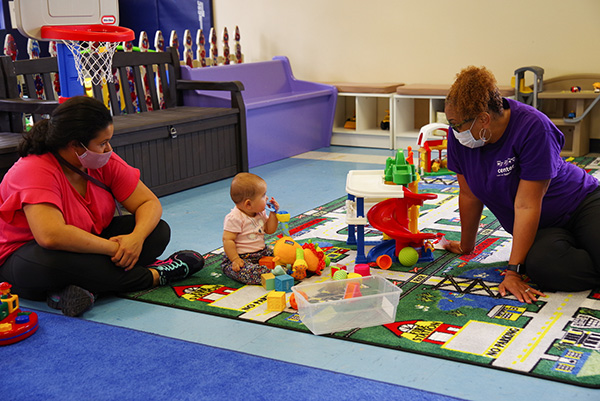
Melanie Richardson, right, co-founder and executive director of childcare education nonprofit TrainingGround, was one of more than 50 scholars and practitioners who developed grant proposals as part of Count the Costs Research Weekend.
Researchers from Tulane and other institutions came together in March for a three-day workshop aimed at helping scholars quantify the effects of racial inequity in the United States. Hosted by the Freeman School’s Albert Lepage Center for Entrepreneurship and Innovation, Count the Costs Research Weekend brought together scholars from a variety of academic disciplines to develop research proposals that investigate the barriers that BIPOC (Black, Indigenous and People of Color) experience in society, the economic impact of those barriers and viable approaches to addressing them. Those who participated in the weekend’s programming were invited to use their proposals to apply for research grants to be awarded from a funding pool of $100,000.
Twenty-eight teams and individual researchers took part in the weekend’s activities, which included speakers, a resource panel presentation, meetings with project advisers and individual group work. Eight teams were selected to present their proposals to a panel of evaluators on the workshop’s final day.
“Tulane’s motto is ‘Not for oneself, but for one’s own,’ ” said Rob Lalka, executive director of the Lepage Center. “These research questions begin to ask an all-important question: Have we defined ‘one’s own’ too exclusively? The work of this research offers us all a chance for a much more thoughtful and comprehensive take on who ‘one’s own’ should be. I’m grateful that the researchers who participated are up to this difficult but critical task.”
Count the Costs Research Weekend began on Friday, March 12, with a presentation from David St. Etienne, president of the Louisiana Chamber of Commerce Foundation, who detailed some of the issues he’s grappled with during his career in economic development. His talk was followed by a presentation on Anti-Racist Research Scholarship by Samantha Francois, assistant professor at the School of Social Work, and a resource panel presentation in which partners from across the university and the region discussed various databases and archives available to researchers. Panelists included representatives
from Tulane institutes including the Murphy Institute, the Cowen Institute, the Taylor Center for Social Innovation, the Center for Public Service and the Mary Amelia Center for Women’s Health Equity Research as well as from community partners including the Welcome Table, Whitney Plantation and the New Orleans Data Center. Friday’s program ended with a roundtable discussion between Lalka and impact investor Daryn Dodson, who discussed his research on racial bias among venture fund managers.
“Friday’s discussion with Daryn Dodson was a great way to kick off the weekend,” said Darrin Miller, a graduate student at Tulane’s School of Public Health and Tropical Medicine and participant in the workshop. “Hearing from someone who has applied academic research to his industry to work toward greater racial equity inspired me to get to work.” Saturday’s programming was dedicated to group work and proposal development. Each team was paired with two advisers, many of whom were resource panelists. The advisers talked through the teams’ proposals and directed them to relevant data sources and community partners.
On Sunday, the Lepage Center selected eight teams to present their proposals to a panel of evaluators.
“We were very excited that our proposal was selected to present on Sunday,” said Marva Lewis, professor in the School of Social Work. “Our research looks at parent-child bonding during the no-cost, everyday ritual and routine of combing hair. We received valuable feedback from the panel of evaluators that we are using to revise our final proposal to help us ‘speak the language of economics.’ We believe that culturally valid, community-based early childhood interventions will yield an economic benefit to our country through future generations.”
The panel of evaluators included Anneliese Singh, chief diversity officer at Tulane; Thomas LaVeist, dean of Tulane’s School of Public Health and Tropical Medicine; Jasmijn Bol, professor of accounting at the Freeman School; Ted Fee, senior associate dean and professor of finance at the Freeman School; Margaret Montgomery-Richard, former board chair of the New Orleans Regional Black Chamber of Commerce; and Aaron Walker, founder and CEO of Camelback Ventures.
“We believe it’s important to view the history of inequity not only as morally deplorable but also financially illogical,” said Ira Solomon, Freeman School dean. “Many of our students and faculty members had begun thinking about these issues before we announced this initiative, so I’m hopeful this weekend of communication and collaboration will lead to some valuable and impactful research projects.”
Recipients of Count the Costs research grants were announced in June.


